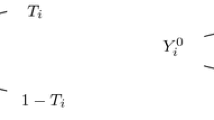Abstract
Pollsters often want information on issues that are considered sensitive. The IRS cannot estimate the proportion of persons who cheat on their taxes by asking a random sample of persons if they cheat, because everyone (almost) will say “no,” including some who are lying when they give that answer. The randomized response technique is a way around the problem of people lying when they are asked a sensitive question.
Access this chapter
Tax calculation will be finalised at checkout
Purchases are for personal use only
Similar content being viewed by others
References
Sarah Boxer (1987), “AIDS and epidemiology. Women and drugs,” Discover, 8 (7): 12.
S.L. Warner (1966), “Randomized response: A survey technique for eliminating evasive answer bias,” J. Amer. Stat. Assoc., 60: 63–69.
Author information
Authors and Affiliations
Rights and permissions
Copyright information
© 1996 Springer Science+Business Media New York
About this chapter
Cite this chapter
Scheaffer, R.L., Watkins, A., Gnanadesikan, M., Witmer, J.A. (1996). Randomized Response Sampling: How to Ask Sensitive Questions. In: Activity-Based Statistics. Textbooks in mathematical sciences. Springer, New York, NY. https://doi.org/10.1007/978-1-4757-3843-8_29
Download citation
DOI: https://doi.org/10.1007/978-1-4757-3843-8_29
Publisher Name: Springer, New York, NY
Print ISBN: 978-0-387-94598-9
Online ISBN: 978-1-4757-3843-8
eBook Packages: Springer Book Archive




